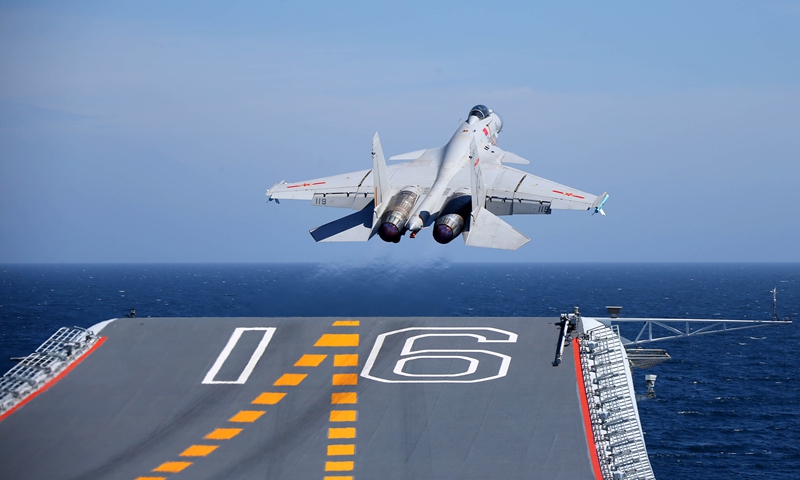
A J-15 carrier-borne fighter jet takes off from the flight deck of the aircraft carrier Liaoning during a maritime training exercise on July 1, 2017. The Chinese aircraft carrier Liaoning and its carrier strike group carried out realistic training in an undisclosed sea area on July 1, 2017. (eng.chinamil.com.cn/Photo by Li Tang)
During the latest voyage by the aircraft carrier
Liaoning, fighter jet pilot instructors from the Chinese People's Liberation Army (PLA) Naval Aviation University reportedly received certification to operate on carriers at night, marking the stage that the university can now coach pilot cadets nighttime carrier operations. This means China's aircraft carriers will get night combat-capable pilots faster than before, analysts said on Sunday.
In the recent certification exam, several pilot instructors from the university steered J-15 fighter jets and landed on the flight deck of the aircraft carrier
Liaoning, which was sailing in the Bohai Sea on a windy night with fierce sea waves, the PLA Daily reported on Friday.
This marked that the university is now capable of coaching pilot cadets to operate carrier-based fighter jets at both daytime and nighttime, the report said.
The PLA's first batch of carrier-based fighter-jet pilots
mastered night combat skills in 2018. And now, having instructors gaining related techniques will allow them to teach cadets properly without letting the latter explore by themselves. This will help generate China's aircraft carrier nighttime combat capability more efficiently than before, a Chinese military expert told the Global Times on Sunday, requesting anonymity.
"The biggest challenge of landing on a carrier at night is the low visibility, as there is no surrounding environment for reference. Relying on only light instructions on the carrier to accurately land on the small flight deck is a huge test to a pilot's skill and courage, the PLA Daily quoted a landing signal officer on the
Liaoning as saying.
Daytime takeoff and landing are already difficult and dangerous, as a carrier flight deck is much smaller than a land-based airfield, analysts pointed out.
In other navies that operate aircraft carriers, like those of the US and France, fewer than 60 percent of pilots are qualified for nighttime operation due to its high difficulty, China Central Television quoted Chinese military expert Yin Zhuo as saying.
But nighttime operation is crucial in combat, because surprise attacks are easier at night, and if a long-distance operation starts in the afternoon, it would also require landing at night, Yin said.
The
Liaoning's latest voyage bagged many other results, including giving certification for daytime carrier operation to a new batch of pilot cadets, the PLA Daily report revealed.
Pilot instructors who operated at night and pilot cadets who operated during the day all succeeded in landing on their first tries, the report said, noting that the number of people who received a certificate in a single voyage by the
Liaoning reached a record high.
Also during the voyage, an
all-female crew independently completed a support mission of dispatching helicopters, including Z-8 and Z-9, on the
Liaoning for the first time, js7tv.cn, a news website affiliated with the PLA, reported in late July.




